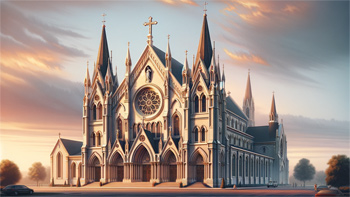The Catholic Church, also known as the Roman Catholic Church, is the largest Christian church, with more than a billion members worldwide. It has played a significant role in the history and development of Western civilization. The Church is led by the Pope, based in Vatican City, and it teaches that it is the one true church founded by Jesus Christ. The Catholic Church is known for its long-standing traditions, rituals, and spiritual practices, which include the celebration of the Sacraments, veneration of the Virgin Mary and the saints, and adherence to the teachings of the Church as guided by the Pope and the bishops.
The foundations of the Catholic Church are deeply rooted in the teachings of Jesus Christ, who, according to Christian belief, appointed the apostle Peter as the first leader of his followers, making him the first Pope. This apostolic succession is a key element of the Church's structure, with the Pope regarded as Peter's successor. The Church's doctrine is based on the Bible and the traditions that have developed over two millennia, interpreted and taught by the Magisterium, the Church's teaching authority.
The Sacraments of the Catholic Church
The Sacraments are fundamental to Catholic faith and practice. They are seen as means of grace, instituted by Christ, through which believers receive divine life. The Church recognizes seven Sacraments: Baptism, Confirmation, Eucharist, Penance (Confession), Anointing of the Sick, Holy Orders, and Matrimony. Each Sacrament is a visible sign of an invisible grace, providing spiritual nourishment and strengthening the faith of believers. The Eucharist, also known as the Mass, is the central act of Catholic worship, where Catholics participate in the sacrifice of Christ by consuming the consecrated bread and wine, believed to become the body and blood of Jesus Christ.
The importance of the Sacraments lies in their role in guiding the faithful through the different stages of life, from birth to death, and in their power to sanctify the daily lives of Catholics. Through the Sacraments, Catholics experience the presence of God in the most significant moments of their existence, drawing closer to Him and the community of believers.
The Role of the Pope and Bishops
The Pope, as the Bishop of Rome, is the supreme leader of the Catholic Church. He is considered the spiritual successor to Saint Peter, who, according to Catholic tradition, was appointed by Jesus as the head of his disciples. The Pope's responsibilities include governing the Church worldwide, defining doctrines, and facilitating unity among the faithful. The College of Bishops, together with the Pope, shares in the responsibility of teaching, sanctifying, and governing the Church. Bishops are appointed to lead local dioceses, guiding the clergy and laypeople in their jurisdiction and ensuring that the teachings and practices of the Church are faithfully observed.
The leadership structure of the Catholic Church, with its emphasis on apostolic succession and hierarchical authority, underscores the Church's unity and continuity from the time of Christ to the present day. The Pope and bishops play a crucial role in preserving the integrity of Catholic doctrine and practice, serving as guardians of the faith for the worldwide Catholic community.
Catholic Teachings and Social Doctrine
Catholic doctrine encompasses a wide range of teachings on faith and morals, including beliefs about the nature of God, Jesus Christ, the Trinity, the Virgin Mary, the saints, and the afterlife. The Church also has a rich social doctrine, which addresses issues of justice, peace, and the dignity of human life. The principles of Catholic social teaching, such as the common good, solidarity, and subsidiarity, guide Catholics in their engagement with the world and their efforts to promote human rights, social justice, and care for the poor and vulnerable.
The Catholic Church's teachings are articulated in the Catechism of the Catholic Church, a comprehensive exposition of faith that covers the Creed, the Sacraments, moral life, and prayer. The Church encourages Catholics to live out their faith in daily life, not only through personal piety and participation in the Sacraments but also through acts of charity and service to others.
Global Presence and Cultural Impact
The Catholic Church has a significant presence around the globe, with communities in every continent. It is a multicultural and multilingual community that celebrates its unity in diversity through the universal liturgy and shared beliefs. The Church has been instrumental in the development of education, health care, and social services, founding schools, universities, hospitals, and charitable organizations worldwide.
The cultural impact of the Catholic Church is immense, influencing art, music, literature, and philosophy throughout history. The Church has been a patron of the arts, commissioning works from some of the world's greatest artists, such as Michelangelo and Leonardo da Vinci. Catholic theology and spirituality have also contributed to philosophical thought, ethical discussions, and the shaping of Western legal and social norms.
In essence, the Catholic Church is not just a religious institution but a living, breathing community of faith that spans centuries and continents. It is a church that has faced challenges and undergone reforms, always striving to remain faithful to the teachings of Jesus Christ while engaging with the changing world. For Catholics, the Church is a spiritual home, offering guidance, sacramental grace, and the promise of eternal life.

